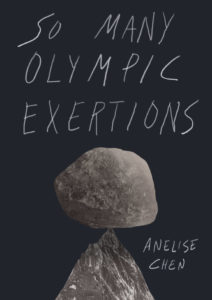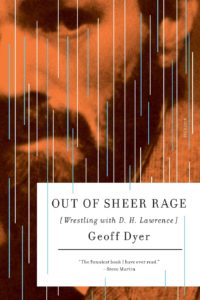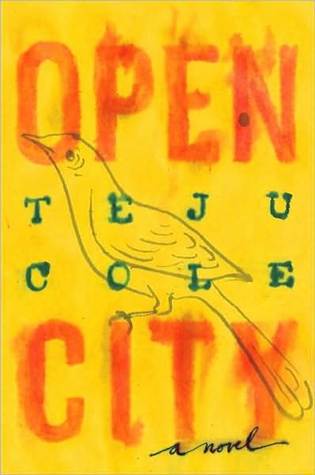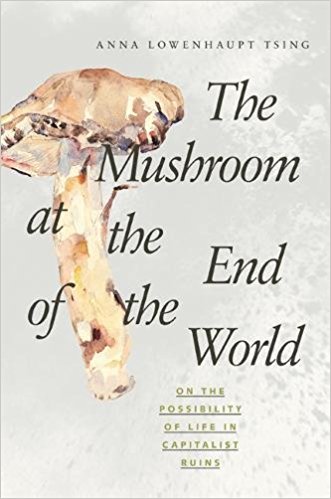Anelise Chen’s novel, So Many Olympic Exertions (Kaya Press, 2017), does the at-times beautiful, at-times sorrowful, at-times painstaking work of enacting life today in a world that often asks us to work or play or cheer or care in ways we both want and don’t want at all. Told in fragments, the novel captures that grey grip of depression alongside the sharper, pronounced grip of obsession. It spirals inward and out, touching on hope, hopelessness, trying, giving up, and simply living, when living, simply, is hard. Few books I’ve read have so accurately and touchingly portrayed the strange and frustrating feeling of living and working and trying in America today. Anelise and I met at the Hungarian Pastry Shop in New York City to talk about her novel, as well as sports, sadness, fragments, mollusks, and more. At times, it felt like Anelise was interviewing me. We never ate the cookies that were on our plate. It’s all below.
 Devin: There’s that line in your book that is its own spin on F. Scott Fitzgerald’s quote, as it says, “Everything is hopeless and still we live.” To me, that really felt like a way to view your book. It feels like in your book, Athena understands that everything is hopeless and is a little wishy-washy on the live part.
Devin: There’s that line in your book that is its own spin on F. Scott Fitzgerald’s quote, as it says, “Everything is hopeless and still we live.” To me, that really felt like a way to view your book. It feels like in your book, Athena understands that everything is hopeless and is a little wishy-washy on the live part.
Anelise: Hah, yes.
And I don’t know, I guess I wanted to ask you about that line in particular and if that notion of hopelessness informed your book at all.
You know, I’ve been getting this comment a lot and it makes me so happy. People say, “This is a book about hopelessness and depression and yet it still moves.” And that makes me happy because that was the whole struggle of the book, this idea of how you write about inaction and despair and the inability to continue and still make people turn the pages and make time go by. The book was this project I imposed upon my life so I could get through it. It was a way to pass the time.
I was going to ask what prompted the book. Was there a moment where you became conscious you were writing a book? Was there a specific decision you made to write the book?
Well at first it wasn’t a conscious decision. Eight years ago, when I first started taking notes for the book, I got news that two of my friends had passed away. And after I got the news, I had this moment, I remember, of sitting in a hotel room watching the Vancouver Olympics, and suddenly everything became so charged with meaning. I was hooked but I didn’t really interrogate it too much. I just thought, “You know what, I’ll run with this, anything that gets me excited,” even though it seemed really absurd. “It doesn’t matter, this is what’s getting me up in the morning, I will take whatever I can get.”
Yeah, I feel that.
And the videos I found myself drawn to at the beginning were really gruesome. I mean, I began by watching injury videos. I watched collapse videos. And that was how I started.
Oh also, I was reading Out of Sheer Rage at the time. Have you read that book?
No! I haven’t.
It’s a really interesting book. It’s about having an inability to write. And towards the end he says something about becoming obsessed with his own depression. And he says that that the thing that got him out of his own depression was an obsession with his own depression. But you know, you can only use that trick once.
Sure.
So I thought, maybe this is the one time I’m going to use my lifeline.
That’s interesting what you say about watching the Olympics and having them become filled with meaning. Because I know in the book, there’s this question of whether sports are life or death. Do you find that sports become a kind of vessel for us to fill with meaning?
Yeah, definitely. Sports become about life and death when that’s how we choose to signify them. In the book, I talk about how sport has ritual origins, how all athletic exertion begins as some kind of ceremony. To summon fertility or good weather or an abundant harvest. And then, you know, there’s something very basic about watching the human form doing things. It’s very, very life affirming.
Yes! And beautiful at times.
Yeah! And it’s just impossible to look at that and not feel. Like, I find it very affecting to look at a body in motion. It’s like the opposite of the death impulse.
For sure. I was reading this just after I watched that not-that-great movie with Will Smith, Concussion. Which I wish was better!
Hah, yeah.
So I was reading it at a time when I was going through another moment of considering my role as someone who, say, watches football knowing how god-awful it is for people. And sort of considering the spectacle of it. How affirming it is to watch it, and how terrible it feels.
I wonder if the violence of it is the reason why people watch it.
Sure.
If you were to take out the violent aspects of it, then it would be like taking out the sacrificial aspect. I don’t know, it’s interesting. Because the point is that it’s violent. And that is why people enjoy watching it. It’s like a vent for all these other impulses.
And what’s interesting, too, is that I am someone who can sit down and, like, watch a live stream of a marathon for hours. And it’s just people running.
[Laughs]
And in that, there’s like a singular moment, usually just one, like eighty minutes in, when somebody makes a move, and the race is either won or lost.
And that’s where meaning arises, in those sorts of moments. Otherwise it’s just running. But that’s also why it’s beautiful to watch! Because it’s like taking in a landscape. It’s just blank space that’s filled with something.
Hah, yes.
So last semester, I taught a sports fiction seminar, and I made my students watch running, just running, without any sort of mediation.
That’s awesome.
It was this section of Kon Ichikawa’s Tokyo Olympiad, which I write about in the book. There’s this extreme close up of Abebe Bikila running the last part of the marathon. But he’s really just running, and he has no facial expression whatsoever, and it’s complete silence. But then, I think maybe the narrative pressure kicked in, so Kon Ichikawa puts a soundtrack over it with this dramatic music. And then all of a sudden it becomes suspenseful, right?
Yeah.
But I was so much more interested in the silent part. You’re watching his face and trying to think of what he’s thinking but he’s just looking at the asphalt right ahead of him. That blank focus is so much more interesting to me than if he’s going to win.
I agree. There was this moment last year where Nike, in very capitalistic fashion, sponsored three athletes to try to break two hours in the marathon. And they set up this perfect course for them in Italy. And they had a bunch of Olympians pacing them. But it was weird because it was like 1 AM here when the race started, and there was this strange moment where I was in a bar and it was on.
That’s so weird.
And I was on Twitter and people were tweeting about it! And for this small moment, I was like, wow, everyone’s interested in marathoning. But I think it was because something was on the line. And, like you say, it was just this superimposed barrier that made people interested, as opposed to the act of it.
Yeah. You need a purpose. You need a goal.
Which sort of threads through your book, too. This idea of like purposelessness, or establishing rituals for yourself. Like going to the gym in order to give your day meaning or purpose.
I know, it can be sad.
Yeah.
So what was the outcome of the race?
Oh! Well Eliud Kipchoge, who is without a doubt one of the best living marathoners, almost did it. He ran just under two hours and one minute. Which is unbelievable. I don’t think they were thinking it could actually happen.
It was a publicity stunt.
Yeah. But he’s someone, speaking of Abebe Bikila and that clip you’re talking about, that I could just watch forever. Because his face is so calm. And sometimes he’s smiling at like mile 24 of a marathon. And I don’t know, I could watch that and almost cry.
[Laughs]
But that’s because you actually run marathons, right?
Yeah! I do. But you’re right in the sense that I can try to find something in my experience that relates to the idea of him smiling in that moment. I watch that and feel like I could run or live in the same way.
So it’s almost aspirational for you. Is the pleasure of it like: I can’t believe he’s smiling because I would not be smiling?
No, I think it’s I can’t believe he’s smiling but I can understand why he is.
Because you’re totally tuned into that high.
Yeah. And to your point, I think there’s a lot of people who would say why they fuck is he smiling. And I think that’s a kind of beauty, because of the sense of surprise, that you have some idea of what he’s going through but still can’t bridge that gap to rationalize why he would be smiling.
I see.
And I think that’s a kind of pleasure of viewing. And then there’s another pleasure of viewing where you understand much more of what a person might be going through and take a kind of joy from that.
Yeah, and that’s a much deeper understanding than most people have. Because I don’t run marathons, so I can only imagine what that might be like. That’s really interesting. Have you read Open City by Teju Cole?
Yes!
In the first few pages, the narrator is observing a marathon runner who has just finished racing and is limping back to the subway and he thinks, like, there must’ve been some sort of personal glory in this man’s day, but I can’t see it.
Hah, sure.
Do you ever think about why you put yourself through so much pain?
Now I feel like I’m getting interviewed!
I’m just curious!
I do think about that! It’s funny that you brought up Open City, because I love that passage. Have you ever watched the marathon here in New York?
Yeah, I have.
I’ve run it a few times, and that’s what happens.
That’s exactly what happens!
I finish, and I get my little poncho, and they make you walk so far, and then I leave and I’m on the streets of New York wearing a stupid poncho and walking toward the 1 train.
[Laughs]
And it’s such a sharp moment of contrast between this extended period of effort where it feels like so many people care about what you’re doing. For hours, you’re running through the streets.
That’s so true. And people are cheering.
They’re cheering nonstop! And then you stop and it’s like, bloop, all gone.
Like once the context is removed –
Then you’re just a person on the train.
I know!
And I think there’s no better place in the world to understand that then here. Like, part of me hates that feeling of running and then being done and having no one care. And part of me really, really enjoys it.
But you don’t question running? You just love doing this thing. Do you ever think about it?
You know, I was reading another interview of yours where you were talking about being the worst player on the very best team. For water polo, right?
Right.
Which was sort of my relationship to running. I was good enough to run in college, but while there, I was one of the worst runners on a not-so-great team. So I was just not a great college runner. And I felt like quitting a lot. But I think there’s something very particular to me about running that is sort of nostalgic. To me, I associate running with a kind of – is there a word for when your physical becomes emotional? For when your awareness of the body becomes emotional? To me running offers a physical intelligence that ties into my way of understanding life.
Yeah! Yes.
That’s a better way to say it.
Last semester, we were talking about that all the time, that the body has an intelligence that is inaccessible to the intelligence that we express through language. Which is why sports can be so hard to talk about, the experience of them, because those two intelligences are so divorced from one another. Once you try to put that experience into words, it’s already corrupted.
Yes. And I still try all the time.
[Laughs]
But I agree. And that’s something I’ve only come to understand in the past few years, how so much of the way I’ve come to understand the world has come from running through the world.
Wow, that’s so interesting.
Yeah, well, it’s just because every day I run in the morning and it’s like waking up into my body.
Yeah.
And I think when you do anything long enough, you develop a way of listening to yourself do that thing. A hyperawareness. So the way I’m in touch with my body when I’m running might be similar to way someone else is in touch with their body when they’re a yoga teacher, or whatever. And when I don’t do it, I miss that understanding of my body.
I really like that. So, my new project is all about mollusks, and…I promise I have a point to mentioning this…
Mollusks!
Yeah! It suddenly reminded me of what you were saying because snails navigate through slime trails that are like snail highways that allow the snail to know where it’s been and where other snails have been. It actually has to put itself through terrain so that it can explore, and have knowledge, and have this story. And I think that’s so interesting, because we never think about what we know through our bodies as opposed to our intellect. Our bodies can provide a gateway to self-knowledge too.
Yeah, and I think for everyone it’s different. Like, I didn’t think of myself as a writer seriously until I started running seriously again after college.
And some writers can’t write unless they’re walking, or doing something else.
Yes! And this is a conversation that I don’t think many writers have, this idea that I don’t think practicing writing alone is sufficient. I guess what I mean is that everyone, whether they’re aware of it or not, has something that really informs their writing, whether it seems tangential to it or not. Like, if we all sat in rooms writing without leaving the rooms, it could be bad.
I can’t imagine. But that’s always how I thought writers were supposed to write. So I did that for many years. I had no idea.
I did too! My first favorite writers were people like Don Delillo, who basically doesn’t exist.
I know!
And so I thought that you weren’t supposed to be in the world to write about the world.
Hah, yeah.
But one of the reasons I like your book in a way that’s tangentially related to what we’re talking about, in regards to movement, is your use of fragmented writing as a novelistic form. It gives the book a great deal of momentum. It is a book, as you said, about depression and inaction, but it does move, and I think the fragment helps that.
I think the fragment forces a kind of leaping or jumping. It imposes mental gymnastics. Like, you must leap to get to the next section.
I like that. Leap over all this white space.
Yes. Time has passed. Or another idea is beginning now. And you have to get there.
I’ve always been drawn to fiction that’s told in fragments. My MFA was in fiction, and when I was writing fiction, I had a really hard time writing what I called the connective tissue of plot.
Hah, yes.
Like the kind of shit that’s like – and now they leave the house they were in, and get in the car, and so on.
I know! Why do we have to describe everything? It’s so tiresome.
To me, your book is a book without connective tissue when it comes to plot. It’s all sort of stripped away. Was that a conscious choice?
I don’t know. I’m interested to hear what you think.
Oh jeez!
Hah, well I asked myself over and over while I was writing this why I couldn’t just write, “They got into the car and then they arrive at such and such a destination.” Like, I wanted to write the connective tissue but just couldn’t.
Well it also seems like a book that doesn’t need to rely on it, either. This isn’t a Henry James novel.
Well, now I can say yes, it’s not that kind of novel. But as I was writing it, it was all potentiality.
That’s true.
So as I was creating it –
Did you think that you would just fill in the gaps at some point?
Well, yeah. I mean, I would try to write an entire scene, and then I would feel so repulsed by it and I would go back to this form.
Sure.
But I always wonder why that is, if that’s just a sensibility thing.
I don’t know. I think part of it must be. I used to be scared when I was writing fiction and couldn’t do what you’re talking about that I was just lazy, you know? And I think there still is that imposter-syndrome-driven fear that yes, maybe I am just lazy.
It takes so long!
Hah, yes. But I think it does come down to sensibility, because in the end I just wasn’t interested in it. And if I’m not interested in it –
Right, then it’s going to be boring to everybody. Like, if I’m bored by it, then it’s going to bore you.
Yeah. And again, the fragment works really well for this book. And it’s an interesting question as to why some people are more drawn to it than others. Because I know a lot of people who are very opposed to the fragment, people who really appreciate the inlay of what I would sometimes deem superfluous material.
I was thinking a lot about what writing can do that other mediums can’t do. And I was thinking, you know, if this feels like it may as well be a movie, or a Netflix episode, then I don’t have to do it. To me, the most interesting aspect of writing is how it captures what it’s like to be a thinking presence in the world, so I really wanted to write towards that. You know? This is what it’s like to have a brain, and to have thoughts. And I’m not trying to paint a visual, or move my character through space in the same way that a movie might. That’s not as interesting to me.
The book enacts mental processing.
Yeah.
You read the book, and you’re in the mind of someone who’s trying to grapple with hopelessness and mundanity and the simple endurance of life. And I think the fragment captures that because it is more and more how we think.
Oh, definitely.
Like, I’m talking in fragments now and every so often my attention is drawn away by the fragment of a sound or the fragment of a thing passing by outside.
Yeah.
I have other questions, too. Like: why do we finish things?
Why do we finish things…
You don’t have to answer that.
Hah. No, we have to finish things because if you don’t finish things, then nothing has any meaning. It’s like the marathon!
So, it’s finishing things that gives them their meaning?
Yeah! Imagine if you were just running and running and you never got to the finish line. What would it all be for?
Running!
On another note, my favorite character in this book is Athena’s mom. I love the way you capture her loose interpretation of the English language. There’s that one page where she’s talking about her journey to America, and she says that she didn’t have a word for pain, so I pulled my hair. That resonated. This notion of pain being some universal language – that if you don’t have a word for pain, you can just rip out your hair.
Or that if you don’t have a word or a narrative for an experience, then that experience sort of loses its shape. It doesn’t really strike you as an experience. You know, for example, if we didn’t have a word for this form right here, it wouldn’t be a cup, it would just be a shape, and it would be hard to describe it. Towards the end of that monologue, Athena’s mom says that she didn’t have any time to think about meaning – they were concerned with the bare basics of surviving. But also, when you’re going through a certain experience where the narrative isn’t present, it doesn’t become a recognizable thing.
Sure.
Like the concept of depression, right? We pathologize this thing. We say if you’re depressed, there’s this checklist of symptoms. And so when anyone starts to feel those things, we say that’s just depression, and it can become a shortcut. It can completely flatten our understanding of what that experience is like.
Yeah.
So that’s one thing – how the word helps us recognize what that feeling is. But the other thing is that before we had a word for this thing called depression, and it was just an experience that people went through, it might’ve seemed less alarming, or not something we had to fix. It was simply the water you were wading or swimming through.
So in a way, naming runs the risk of reducing our capability of finding nuance in that thing?
I think so! Because immediately your mind goes to the checklist of symptoms.
Sure, or because this is a coffee cup –
There’s only one function it has.
Like I’m not going to put flowers in it. But I could.
You could! You could do so many things with it.
That’s interesting.
So that’s always what I think of when I think of my mom, and her generation. Like they didn’t have this thing called depression. It was just life.
Hah. When I was growing up, my father was sort of this stereotypical American middle-class father. This whole when-I-was-your-age shtick. I’m glad we have a deeper understanding of depression now, but at the same time, there’s a part of me that longs for that long-gone generational impulse that just goes, “Well, this is life.” I mean, I don’t actually long for it, but, you know.
Just muscle through it.
Yeah.
And there’s something really problematic about pathologizing everything. Because when you’re diagnosed with depression or anxiety, it becomes your problem that needs to be fixed. And it’s really hard to focus on other things. Sometimes I’d say, “I’m depressed,” and then I wouldn’t get out of bed. And I don’t know – being depressed is really hard, but I always wondered if it was influenced by my preconceptions, if, because I was aware of what depression was, I started playing toward that.
Yeah, like in your own life.
Yeah. And this is a very problematic thing to say, and I’m not saying that all mental illness is invented, or that people should simply get over it. But the mother character in this book is just presenting an alternate way of thinking about the Western ways that we have come to understand human experience.
Sure.
And now I’m just rambling, and this is almost like TMI, but I have been prescribed medication over and over again, and every time I have to say, you know, actually, I don’t think I need it.
Yeah.
So I always wonder about that – why is this thing I’m feeling unacceptable? Why does it have to be something that’s fixed and controlled?
In the book, there are moments where Athena internalizes that feeling, too. There’s that moment in the book when you talk about cross country skiers, and the lactic acid buildup and how they collapse at the finish line, or about doctors who will laser-burn people to simulate pain, or all these athletes who have a higher tolerance for pain. And then you talk about how there are people who misplace their keys, and then they give up on the day.
Hah, yes.
And that fragment really struck me because I’ve experienced both of those situations. Like I’ve had those days where I wake up and stub my toe and can’t find my keys and miss my train just as I walk into the station, and I’ve had an enormous tolerance for it. And then I’ve had some days where all of that happens and I’m just crying.
Yeah, yeah. It’s a conflicting feeling because you both want to buy into this rhetoric of resilience, but at the same time resilience is so often used against us to make us work harder for less.
That’s why I had such a hard time reading this book, in a good way! Because there were some moments when I was unashamedly in love with what Athena was saying, even though I knew you were critiquing clichés of resilience, or capitalism, or just American society in general. And I would be like, “Fuck yeah, endurance!” before I had to check myself.
I know! And I still feel that way sometimes. It feels good to endure. And it feels good to win.
I know, and this book seems a critique of capitalism in that sense, too. Where so much of this book touches on the idea of cognitive dissonance, and I’m thinking of the one you just talked about – where it feels good to be a worker in the system –
Doing a good job.
Yes, doing a good job. But also this system is bad and deeply flawed.
Yeah.
But then, you know, I’m thinking of how few things felt better to me than someone patting me on the head and saying good job.
I know, right?
And that’s a depressing thing – how do you amend, repair, or destroy a system that feels so good to be a part of?
There’s so many things here. Like, does work inherently feel good? Or is that just something we’re conditioned to believe? I mean, I was writing this book and I was thinking that, yes, exertion is necessary. That yes, people have to move, have to exert themselves, that that’s what gives all of our lives meaning. I have something in the book about gravity. If we didn’t have gravity, if we didn’t have resistance, our muscles wouldn’t work. But, still – does it feel inherently good to be a good worker? Or is that just something we’re told?
But we are also some of the only living things on this planet to question why we work.
[Laughs]
Like, all ants do is work.
That’s true. Would they call it work?
Hah. I guess they just call it life.
That’s so funny. All any organism does is live. It’s so funny that we can think that all ants do is work, and all grasshoppers do is play.
When I was reading this book, I kept thinking of the question of why must we go on, knowing that so much of this life is labor. And much of this labor can be joyless. Athena works throughout your book to finish her thesis –
Because she thinks she needs to. Because she thinks that everyone needs a career in order to survive.
And yet thrown up against so much of what Athena encounters in the book, the thesis becomes the most meaningless thing.
Right.
And it’s fascinating how something we’re so often told is full of meaning – this academic, intellectual pursuit – becomes so devoid of meaning as the book progresses.
It’s interesting, because I have friends who are working corporate jobs, and at that point you’re making money so you can live, and therefore that activity must not be meaningless, since it’s allowing you to persist through time. But at the same time, the work that allows you to survive is often what feels most meaningless. And the work that you do that is gratuitous is often what feels most meaningful.
I’m thinking of my friend Matt, who is an ultramarathoner and this summer ran a 300-mile race across Tennessee, carrying everything on his back.
Wow, that’s amazing.
It’s wild. But he consumes so much of my thought process, because he works this relatively mundane job, and lives to do these feats of endurance. Which, honestly, no one actually cares about.
Yeah, they’re utterly useless.
Yeah! This race he did across Tennessee like, maybe 80 people did? It’s directed by the same guy who directs the Barkley Marathons –
The one where the terrain is really difficult.
Yeah. And his point is that it’s all dumb. That you shouldn’t do it for any extrinsic reason. And so there’s this question of why we’re doing this thing that is inherently meaningless.
Yes – the thing we often do for survival feels dumb and trivial, and the thing that is inherently worthless is the thing we live for.
Are you still a sports fan?
Hah, no. I was obsessed with sports for the time I was writing this, and, I mean, it completely changed my outlook –
On life or sports?
On life. And sports. And I feel like I learned the lesson I needed to, and that it’s time for me to move on now.
What’s this mollusk book going to be about?
I don’t know. It’s another thing that I can’t really explain right now – I’m just really obsessed with mollusks. Mollusks are super interesting to me because, if you think about just the static ones, they kind of just find their place –
And then they’re there.
They’re there! And they just chill forever. But they’ve endured through time so successfully.
Have you read The Mushroom at the End of the World?
I have.
You talking about mollusks made me think of it, since they share a similar hyper-focus on such under-focused things.
I really loved that book. I’m trying to transition into natural history and have been thinking a lot about nature, especially because I got to live in New Mexico earlier this year. And I’ve mostly lived in cities my whole life. You know that sense of peace you get from running?
Sure.
If you see a vista, it’s almost the same thing.
It is!
As I was driving through the Southwest, I was thinking of how I was the only human being as far as I could see. And it was such a powerful feeling.
Yeah – that’s such a similar joy to what I feel when running. Just such a pure loneliness of movement. That’s why I love running in New York City at night. It’s like looking out a plane window, or a train while it’s moving.
Yeah, that’s why I am kind of happy that my phone is dead. It’s just really nice to look at things. When I got to go to the Southwest, I realized that I don’t actually need a lot to be happy. Being in New York is really difficult, because you’re being told constantly that you need more and more things to be happy. And it’s all fake. At least for me, the Southwest landscape had its own inherent meaning, and I was happy just to be in it, and happy just to be present. I had this experience where I thought this is it, this is enough. I have enough. I am enough. And that is such a powerful feeling. And I don’t know if you can have that feeling in the city, because it’s extremely demotivating and dangerous in some ways, because I guess that feeling’s not good for the economy.
This post may contain affiliate links.







